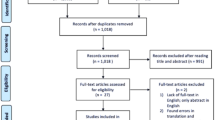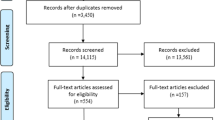Abstract
Objectives
Oxaliplatin accumulates in dorsal root ganglia, causing an axonal neuronopathy. Symptoms include numbness, pain and gait disturbance which may persist and impact on quality of life (QOL). Despite widespread use of this drug, its late effects and patient satisfaction outcomes have not been widely reported. Furthermore, there has been limited qualitative research published in this area. The objectives of this study were to establish the incidence and clinical impact of chronic peripheral neuropathy.
Methods
We conducted a cross-sectional observational study of patients who started oxaliplatin treatment at least 2 years prior to study commencement. Patients were assessed in three ways: clinical assessment encompassing neurological examination and nerve conduction studies to calculate a total neuropathy score (TNS); self-reported assessment via validated questionnaires; and assessment by recorded interview. The clinical and questionnaire-based assessments were analysed quantitatively and the interview data used for qualitative assessment.
Results
Twenty-five patients consented to participate. The mean starting dose of oxaliplatin given was 92 mg/m2. The cumulative dose received ranged from 375 to 2,400 mg, with a mean cumulative dose of 1,515 mg. Oxaliplatin was ceased due to neuropathy in six patients (24 %), after a mean of 9 cycles of treatment. Modified TNS ranged from 1 to 15 with a mean of 9.5. There was a statistically significant correlation between cumulative oxaliplatin dose and TNS. Quality of life and functional impact questionnaires showed mildly lower physical quality of life, higher pain scores and functional impairment secondary to sensory deficit. Qualitative analysis demonstrated variable bio-psycho-social effects of chronic neuropathy but, importantly, highlighted that many patients felt they had been insufficiently warned of the risk of neuropathy. Despite this, the majority was satisfied with their decision to receive the drug.
Conclusion
Many patients objectively demonstrated mild to moderate oxaliplatin neuropathy >2 years post-treatment. The majority of patients did not recall being warned of the risks of chronic peripheral neuropathy. Many of those who recall being warned did not feel sufficient emphasis was placed on the issue. Despite a varying burden of neuropathic symptoms, the majority of patients were highly satisfied with their decision to receive oxaliplatin.






Similar content being viewed by others
References
Bécouarns Y et al (2001) Oxaliplatin: available data in non-colorectal gastrointestinal malignancies. Crit Rev Oncol Hematol 40(3):265–272, ISSN 1040–8428. Disponível em: < http://www.ncbi.nlm.nih.gov/pubmed/11738949 >
Pasetto LM et al (2006) Oxaliplatin-related neurotoxicity: how and why? Crit Rev Oncol Hematol 59(2):159–168, ISSN 1040–8428. Disponível em: < http://www.ncbi.nlm.nih.gov/pubmed/16806962 >
Quasthoff S, Hartung HP (2002) Chemotherapy-induced peripheral neuropathy. J Neurol 249(1):9–17, ISSN 0340–5354. Disponível em: < http://www.ncbi.nlm.nih.gov/pubmed/11954874 >
Grothey A, Goldberg RM (2004) A review of oxaliplatin and its clinical use in colorectal cancer. Expert Opin Pharmacother 5(10):2159–2170, ISSN 1744–7666. Disponível em: < http://www.ncbi.nlm.nih.gov/pubmed/15461551 >
Grothey A (2005) Clinical management of oxaliplatin-associated neurotoxicity. Clin Colorectal Cancer 5(Suppl 1):S38–S46, ISSN 1533–0028. Disponível em: < http://www.ncbi.nlm.nih.gov/pubmed/15871765 >
de Gramont A et al (2000) Leucovorin and fluorouracil with or without oxaliplatin as first-line treatment in advanced colorectal cancer. J Clin Oncol 18(16):2938–2947, ISSN 0732-183X. Disponível em: < http://www.ncbi.nlm.nih.gov/pubmed/10944126 >
Grothey A (2003) Oxaliplatin-safety profile: neurotoxicity. Semin Oncol 30(4 Suppl 15):5–13, ISSN 0093–7754. Disponível em: < http://www.ncbi.nlm.nih.gov/pubmed/14523789 >
André T et al (2004) Oxaliplatin, fluorouracil, and leucovorin as adjuvant treatment for colon cancer. N Engl J Med 350(23):2343–2351, ISSN 1533–4406. Disponível em: < http://www.ncbi.nlm.nih.gov/pubmed/15175436 >
Krishnan AV et al (2006) Oxaliplatin and axonal Na+ channel function in vivo. Clin Cancer Res 12(15):4481–4484, ISSN 1078–0432. Disponível em: < http://www.ncbi.nlm.nih.gov/pubmed/16899592 >
Land SR et al (2007) Neurotoxicity from oxaliplatin combined with weekly bolus fluorouracil and leucovorin as surgical adjuvant chemotherapy for stage II and III colon cancer: NSABP C-07. J Clin Oncol 25(16):2205–2211, ISSN 1527–7755. Disponível em: < http://www.ncbi.nlm.nih.gov/pubmed/17470850 >
Pietrangeli A et al (2006) Persistence of high-dose oxaliplatin-induced neuropathy at long-term follow-up. Eur Neurol 56(1):13–16, ISSN 0014–3022. Disponível em: < http://www.ncbi.nlm.nih.gov/pubmed/16825773 >
Trotti A et al (2003) CTCAE v3.0: development of a comprehensive grading system for the adverse effects of cancer treatment. Semin Radiat Oncol 13(3):176–181, ISSN 1053–4296. Disponível em: < http://www.ncbi.nlm.nih.gov/pubmed/12903007 >
Cornblath DR et al (1999) Total neuropathy score: validation and reliability study. Neurology 53(8):1660–1664, ISSN 0028–3878. Disponível em: < http://www.ncbi.nlm.nih.gov/pubmed/10563609 >
(1995) The World Health Organization Quality of Life assessment (WHOQOL): position paper from the World Health Organization. Soc Sci Med 41(10):1403–1409. ISSN 0277–9536. Disponível em: < http://www.ncbi.nlm.nih.gov/pubmed/8560308 >
Herdman M et al (2011) Development and preliminary testing of the new five-level version of EQ-5D (EQ-5D-5L). Qual Life Res 20(10):1727–1736, ISSN 1573–2649. Disponível em: < http://www.ncbi.nlm.nih.gov/pubmed/21479777 >
Postma TJ et al (2005) The development of an EORTC quality of life questionnaire to assess chemotherapy-induced peripheral neuropathy: the QLQ-CIPN20. Eur J Cancer 41(8):1135–1139, ISSN 0959–8049. Disponível em: < http://www.ncbi.nlm.nih.gov/pubmed/15911236 >
STATACORP. Stata: Release 12. College Station, TX.: Statacorp LP.: Statistical Software. p. 2011
NVivo (2006) Qualitative data analysis software: QSR International Pty, Ltd
Smith J, Firth J (2011) Qualitative data analysis: the framework approach. Nurse Res 18(2):52–62, ISSN 1351–5578. Disponível em: < http://www.ncbi.nlm.nih.gov/pubmed/21319484 >
Hawthorne G, Richardson J, Osborne R (1999) The Assessment of Quality of Life (AQoL) instrument: a psychometric measure of health-related quality of life. Qual Life Res 8(3):209–224, ISSN 0962–9343. Disponível em: < http://www.ncbi.nlm.nih.gov/pubmed/10472152 >
Hawthorne G, Herrman H, Murphy B (2006) Interpreting the WHOQOL-BREF: preliminary population norms and effect sizes. Soc Indic Res 77:37–59
Lavoie Smith EM et al (2013) Assessing patient-reported peripheral neuropathy: the reliability and validity of the European Organization for Research and Treatment of Cancer QLQ-CIPN20 Questionnaire. Qual Life Res 22(10):2787–2799, ISSN 1573–2649. Disponível em: < http://www.ncbi.nlm.nih.gov/pubmed/23543373 >
Höke A, Ray M (2014) Rodent models of chemotherapy-induced peripheral neuropathy. ILAR J 54(3):273–281, ISSN 1930–6180. Disponível em: < http://www.ncbi.nlm.nih.gov/pubmed/24615440 >
Park SB et al (2008) Mechanisms underlying chemotherapy-induced neurotoxicity and the potential for neuroprotective strategies. Curr Med Chem 15(29):3081–3094, ISSN 0929–8673. Disponível em: < http://www.ncbi.nlm.nih.gov/pubmed/19075655 >
Vincenzi B et al (2013) Identification of clinical predictive factors of oxaliplatin-induced chronic peripheral neuropathy in colorectal cancer patients treated with adjuvant Folfox IV. Support Care Cancer 21(5):1313–9, ISSN 1433–7339. Disponível em: < http://www.ncbi.nlm.nih.gov/pubmed/23196819 >
Ramanathan RK et al (2010) Incidence and evolution of oxaliplatin-induced peripheral sensory neuropathy in diabetic patients with colorectal cancer: a pooled analysis of three phase III studies. Ann Oncol 21(4):754–758, ISSN 1569–8041. Disponível em: < http://www.ncbi.nlm.nih.gov/pubmed/19887466 >
Goldberg RM et al (2006) Pooled analysis of safety and efficacy of oxaliplatin plus fluorouracil/leucovorin administered bimonthly in elderly patients with colorectal cancer. J Clin Oncol 24(25):4085–4091, ISSN 1527–7755. Disponível em: < http://www.ncbi.nlm.nih.gov/pubmed/16943526 >
Bennett BK et al (2012) Impact of oxaliplatin-induced neuropathy: a patient perspective. Support Care Cancer 20(11):2959–2967, ISSN 1433–7339. Disponível em: < http://www.ncbi.nlm.nih.gov/pubmed/22426503 >
Tofthagen C (2010) Patient perceptions associated with chemotherapy-induced peripheral neuropathy. Clin J Oncol Nurs 14(3):E22–E28, ISSN 1538-067X. Disponível em: < http://www.ncbi.nlm.nih.gov/pubmed/20529785 >
Tofthagen C (2010) Surviving chemotherapy for colon cancer and living with the consequences. J Palliat Med 13(11):1389–1391, ISSN 1557–7740. Disponível em: < http://www.ncbi.nlm.nih.gov/pubmed/21091028 >
Leonard GD et al (2005) Survey of oxaliplatin-associated neurotoxicity using an interview-based questionnaire in patients with metastatic colorectal cancer. BMC Cancer 5:116, ISSN 1471–2407. Disponível em: < http://www.ncbi.nlm.nih.gov/pubmed/16168057 >
Author information
Authors and Affiliations
Corresponding author
Additional information
Key points
• Mild to moderate oxaliplatin-induced neuropathy >2 years post-treatment is common.
• The psychosocial impact of chronic peripheral neuropathy is significant and varies considerably.
• Majority of patients did not recall being warned of the risks of chronic peripheral neuropathy. Many of those who recall being warned did not feel sufficient emphasis was placed on the issue.
Appendix 1
Appendix 1
Interview questions
-
1.
How is this affecting your life?
-
2.
How is this affecting your work?
-
3.
How does your family support you with symptoms of peripheral neuropathy?
-
4.
Were you well informed about the risk of chronic peripheral neuropathy before receiving the treatment?
-
5.
Do you find that there are enough resources to support groups for chronic peripheral neuropathy?
-
6.
Have you tried anything to make the symptoms go better? Has any of your attempts worked
-
7.
How do you feel about living with chronic peripheral neuropathy?
-
8.
Do you feel that having symptoms of peripheral neuropathy outweighs clinical benefit of oxaliplatin? Do you regret receiving this treatment?
Rights and permissions
About this article
Cite this article
Padman, S., Lee, J., Kumar, R. et al. Late effects of oxaliplatin-induced peripheral neuropathy (LEON)—cross-sectional cohort study of patients with colorectal cancer surviving at least 2 years. Support Care Cancer 23, 861–869 (2015). https://doi.org/10.1007/s00520-014-2423-9
Received:
Accepted:
Published:
Issue Date:
DOI: https://doi.org/10.1007/s00520-014-2423-9




